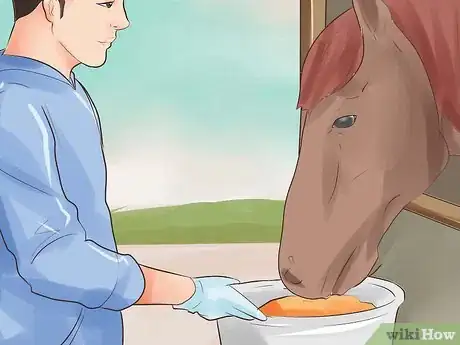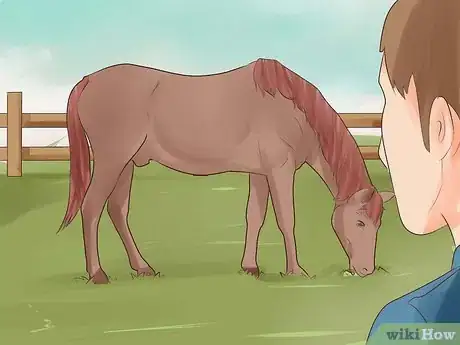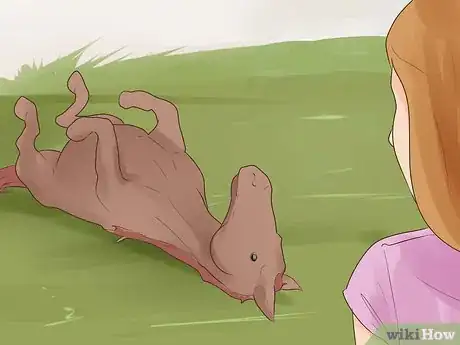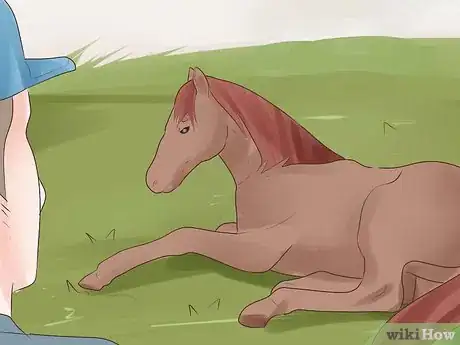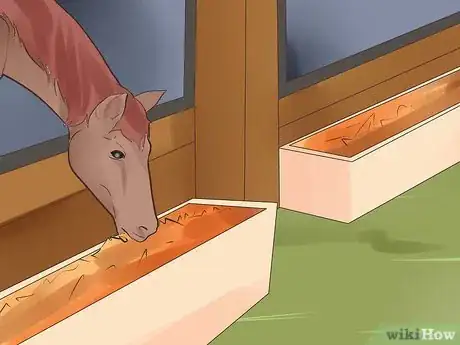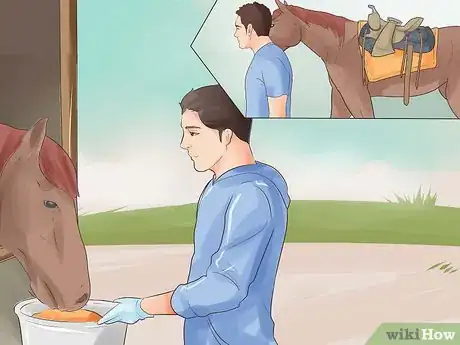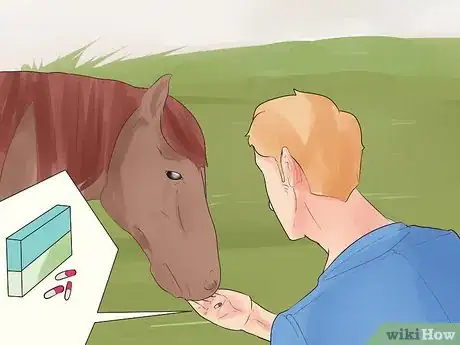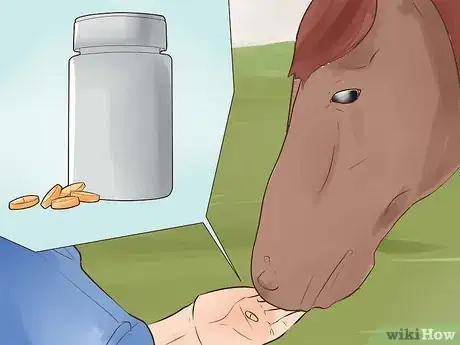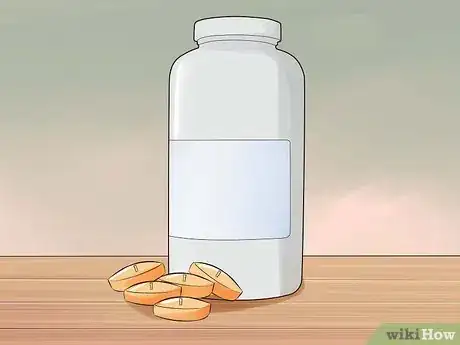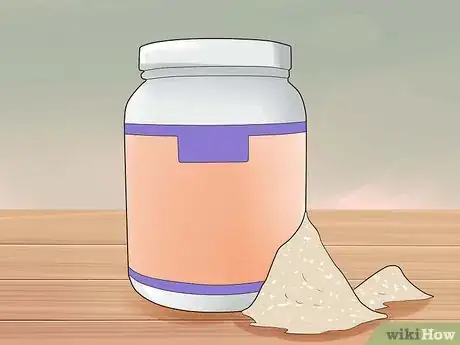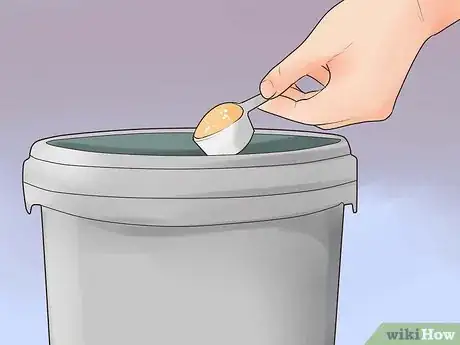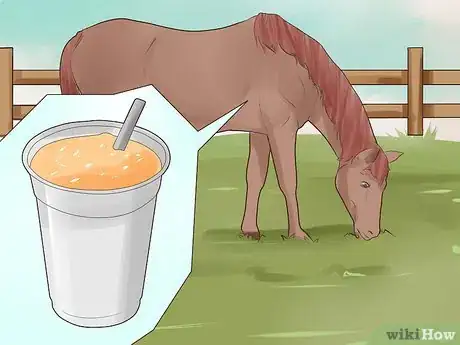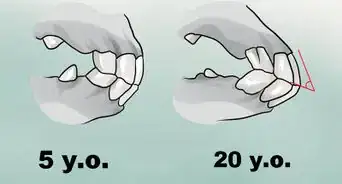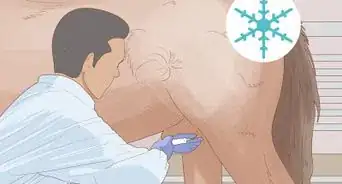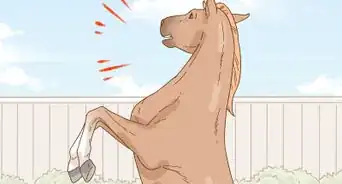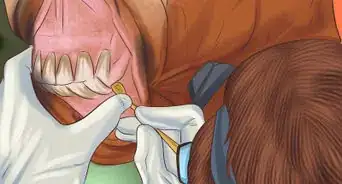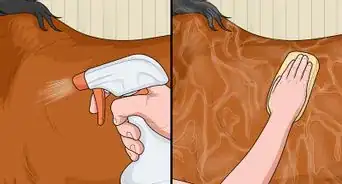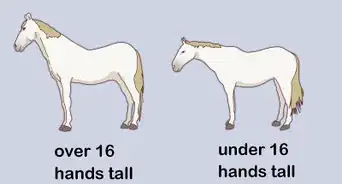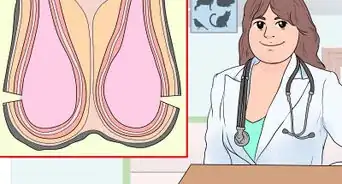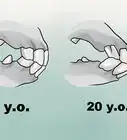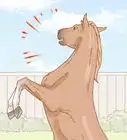X
wikiHow is a “wiki,” similar to Wikipedia, which means that many of our articles are co-written by multiple authors. To create this article, 13 people, some anonymous, worked to edit and improve it over time.
This article has been viewed 67,648 times.
Learn more...
While horses may look big and strong, they actually have rather sensitive stomachs. In particular, horses are prone to developing stomach ulcers. This article explains what causes ulcers, the symptoms, and the treatments dedicated to treating ulcers.
Steps
Method 1
Method 1 of 3:
Causes and Symptoms of Stomach Ulcers
-
1Avoid things that cause ulcers. Diet, exercise, and lifestyle all play factors in whether or not a horse will develop an ulcer. A horse’s stomach is split into two parts--the non-glandular part which immediately follows the esophagus, and the glandular part, which secretes enzymes like pepsin and hydrochloric acid. The glandular part is coated with mucus and bicarbonates, which protect it from the effects of hydrochloric acid or in common terms Muriatic acid! (Imagine drinking Muriatic acid). The ulceration of the non-glandular part of the stomach is the most common type of ulcer because it does not have the same protective lining as the glandular part. Causes of ulcers include:[1]
- Prolonged feeding of concentrates.
- Prolonged starvation and low frequency of feeding (feeding only 3x/day).
- Stress like prolonged and high-intensity exercise, prolonged or frequent transport, prolonged confinement, depression, and no socialization with other horses.
- Prolonged use of NSAIDs (Non-Steroidal Anti Inflammatory Drugs). These drugs block the production of chemicals in the stomach that inhibit acid production.
- Starvation in foals caused by poor mothering mares that lead delayed or infrequent milk suckling.
-
2Look for signs of stomach ulcers in foals. Foals may exhibit different symptoms than those of adult horses. Stomach ulcers are very prevalent in foals who have not suckled milk properly and they can actually lead to death. If you notice any of these symptoms, bring your foal to a horse veterinarian immediately. In particular, look for:[2]
- Colic or extreme abdominal pain
- Teeth grinding or bruxism
- Excess salivation
- Diarrhea
- Poor appetite
- Emaciation or poor body condition
- Attempting to lie on his back
Advertisement -
3Look for symptoms of stomach ulcers in adult horses. Some of the symptoms that foals exhibit may also become apparent in adult horses. Whenever you observe these clinical signs you should suspect stomach ulcers, and immediately consult or bring your horse to a horse veterinarian. They can diagnose it definitively using an endoscope (a device that can see the inside of the horse stomach) and give proper treatment and advice. Look for:[3]
- Poor appetite
- Poor body condition
- Weight loss
- Mild colic
- Mental dullness
- Attitude changes
- Poor performance
- Lying down on back more than usual
Advertisement
Method 2
Method 2 of 3:
Treating Stomach Ulcers with Rest and Hay
-
1Rest the horse for a week. This will ensure that no reflux of acid will reach the non-glandular part of the stomach. During exercise and training, a lot of acids are refluxed, because exercise puts pressure on the stomach. Rapid movement that occurs during training can also cause acids in the stomach to splash. The stomach contains rapidly dividing cells. Resting the horse will ensure that the damaged lining will be repaired.
-
2Place the horse in a stall and make sure that his hay bin is always full. Horse stomachs secrete acid in a cyclical fashion. This means that the acidity will increase and decrease throughout the day--sometimes a horse’s stomach will have a pH of 5 or it can drop to as low as a pH of 1. When a horse has hay 24/7, his stomach will always be full. Hay causes the horse to chew more, thus creating more saliva; saliva protects against strong acids.[4]
- The chewed hay will float in the horse’s stomach and will form a protective layer that prevents the reflux of acids into the non-glandular part of the stomach.
- Roughage like alfalfa hay, for example, contains a lot of substances that act as antacids like calcium, magnesium sulfate, saponins, and mucilage proteins.
-
3Feed your horse before letting him exercise. After you have let your horse rest for a week, you can begin to reintroduce him to exercise. Thirty minutes before the exercise, feed him small amounts of alfalfa hay or 500 grams of alfalfa chaff. The alfalfa will create an alkaline layer that blocks acid splashing into the upper non-glandular section of the stomach.[5]
Advertisement
Method 3
Method 3 of 3:
Treating Stomach Ulcers with Medicine
-
1Give your horse proton-pump inhibitors. These drugs cause complete blocking of acid production, which in turn lets the stomach heal itself. These drugs are more potent than others and are generally given to the horse once a day.
- Omeprazole and pantoprazole are both proton-pump inhibitors. Omeprazole (dose at 0.7mg to 1.4mg/kg daily), is the only FDA approved drug for the treatment of gastric ulcers in horses. Commercially available paste of omeprazole can be given once a day and during transport.[6]
-
2Give your horse histamine Type 2 (H2) receptor Blockers. These drugs cause partial blockage of acid production in the stomach, hence it is given more frequently. In general, you should give your horse this medication three or four times a day.[7]
- Cimetidine, ranitidine, and famotidine are variations of this medication. Dose of cimetidine (300 to 600mg 3 to 4 times a day). Ranitidine is effective in foals and is given once a day.
-
3Try giving your horse protective coatings. These drugs provide a protective lining in the stomach mucosa and aid in its healing process. There are two main kinds of prescribed protective lining, sucralfate and lecithin.
- Sucralfate: this drug binds to the stomach mucosa and may promote healing. Dose for foals (1 to 2 grams in foals 4x a day), in horses (2mg/kg 2x a day).
- Lecithin: contains phospholipids and essential fatty acids like linolenic acid (omega 6), and linoleic acid (omega 3). Lecithin binds to the lipid layer of the stomach, providing an additional layer of protection against acids, omega 3 and omega 6 fatty acids strengthens the cell membranes of the stomach lining.
-
4Try other substances that promote protective lining growth. Other substances that give a protective layer in the stomach include slippery elm powder,[8] low protein whey powder, and psyllium husk. These substances can be given as slurry before feeding, or as top dressing in dry feed.
-
5Give your horse antacids. Sodium bicarbonate can be used up to 200grams per dosing to provide short term relief, and neutralize gastric acid, it is usually given after feeding whole grain rations.[9]
-
6Give your horse probiotics. Probiotics include yoghurt products containing Lactobacilli spp. As a daily, these probiotic supplements can help as the beneficial bacteria competes with ulcer forming bacteria.
- Prostaglandins can also combat bad bacteria. These are recommended in horses that have developed ulcers because they have high doses of NSAIDs.
Advertisement
Community Q&A
-
QuestionA local vet recommended giving a cup of aloe juice daily in two equal doses. A couple of acquaintances assure me this has helped their horses recover from ulcers. Is there any validity to this?
 Kaitlyn WrightCommunity AnswerAloe vera is a natural remedy that helps with many exterior problems. In humans there are mixed results, although some people swear by it for horses. I haven't ever given aloe vera to any of my horses, but usually the vet knows best. Tips for preventing ulcers in horses are upping forage intake (such as grass and hay), and minimizing soluble carbohydrates by feeding pelleted forage and plain grain (always soak beet pulp). Also, remember to try to always feed your horse on time.
Kaitlyn WrightCommunity AnswerAloe vera is a natural remedy that helps with many exterior problems. In humans there are mixed results, although some people swear by it for horses. I haven't ever given aloe vera to any of my horses, but usually the vet knows best. Tips for preventing ulcers in horses are upping forage intake (such as grass and hay), and minimizing soluble carbohydrates by feeding pelleted forage and plain grain (always soak beet pulp). Also, remember to try to always feed your horse on time. -
QuestionI have heard of using lansoprazole. What would be the dosage?
 Community AnswerThe dosage really depends on the horse - it's weight, size, breed, age and condition will all affect the correct dosage. Go to a vet and let them determine the correct dosage for your specific horse. If the incorrect dosage is given, it can cause harm to the horse, or not treat the problem properly in the long run. See a vet.
Community AnswerThe dosage really depends on the horse - it's weight, size, breed, age and condition will all affect the correct dosage. Go to a vet and let them determine the correct dosage for your specific horse. If the incorrect dosage is given, it can cause harm to the horse, or not treat the problem properly in the long run. See a vet. -
QuestionIs it true that chia helps racehorses with ulcers?
 ReebokBeebokCommunity AnswerYes. Chia is very good for horses' stomachs as it promotes healthy gut function in many ways, including soothing and preventing ulcers.
ReebokBeebokCommunity AnswerYes. Chia is very good for horses' stomachs as it promotes healthy gut function in many ways, including soothing and preventing ulcers.
Advertisement
Warnings
- If you notice any symptoms listed in this article, bring your horse to a horse veterinarian immediately.⧼thumbs_response⧽
Advertisement
References
- ↑ https://aaep.org/horsehealth/equine-gastric-ulcers-special-care-and-nutrition
- ↑ https://equimed.com/diseases-and-conditions/reference/ulcers-in-foals
- ↑ https://www.merckvetmanual.com/digestive-system/gastrointestinal-ulcers-in-large-animals/gastric-ulcers-in-horses
- ↑ https://thehorse.com/118592/diagnosing-and-treating-gastric-ulcers-in-horses/
- ↑ https://ceh.vetmed.ucdavis.edu/health-topics/equine-gastric-ulcer-syndrome
- ↑ https://ceh.vetmed.ucdavis.edu/health-topics/equine-gastric-ulcer-syndrome
- ↑ https://thehorse.com/118592/diagnosing-and-treating-gastric-ulcers-in-horses/
- ↑ https://pdfs.semanticscholar.org/0590/ce53a570676ac940d525b84bfd8587a7e2a7.pdf
- ↑ https://thehorse.com/118592/diagnosing-and-treating-gastric-ulcers-in-horses/
About This Article
Advertisement
